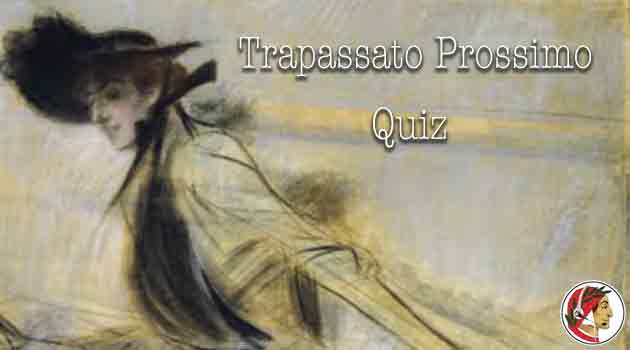Uno sguardo al passato remoto, con un quiz
Essendo un italiano del nord, l’uso del passato remoto nella lingua di tutti giorni non mi è molto familiare. Nelle regioni del Nord Italia infatti, il passato remoto non si usa praticamente mai quando si parla, anche se in alcuni casi si dovrebbe.
In alcune regioni del Sud Italia invece, il passato remoto è molto comune nella lingua parlata e si usa anche quando si dovrebbe usare il passato prossimo.
In teoria, il passato remoto si dovrebbe usare per descrivere azioni del passato che non hanno alcuna connessione con il presente. In altre parole, l’uso del passato remoto è abbastanza arbitrario. Quanto deve essere remoto, lontano nel tempo? Un mese? Un anno? Dieci anni?
Non esiste una risposta. Il buonsenso ci dice che non potremmo usare il passato remoto per parlare di una cosa avvenuta ieri:
- Ieri andai al mercato. —> Ieri sono andato al mercato.
Allo stesso modo, non si dovrebbe usare il passato prossimo per descrivere un’azione chiaramente lontana nel tempo.
- Dieci anni fa ho traslocato. —> Dieci anni fa traslocai.
Non si dovrebbe.
In verità, in tutti i mezzi di comunicazione dove si usa la lingua parlata, cioè la radio, la tv, in molti film, il passato remoto è diventato marginale a favore del passato prossimo.
Nella lingua scritta invece, il passato remoto mantiene una certa importanza. Si usa nelle narrazioni, nei romanzi, nei libri di testo. Personalmente, lo trovo elegantissimo perché è molto irregolare, quindi molto ricercato.
Gli studenti di livello intermedio e avanzato devono studiare il passato remoto per vari motivi. Il primo, e più importante, è che milioni di italiani lo usano tutti i giorni. Quindi, dovete studiarlo per capire quello che la gente dice. Ricapitolando:
- Il passato remoto si usa in vaste aree dell’Italia del sud quando si parla.
- Il passato remoto si usa nella lingua scritta.
- Il passato remoto è il tempo più irregolare dell’indicativo.
Come sempre, è importante cominciare con i verbi avere e essere.
Come potete vedere, sia essere che avere, sono verbi irregolari.
I verbi regolari invece, hanno le seguenti coniugazioni.
Possiamo subito notare che i verbi regolari in -ere hanno due possibili coniugazioni.
In generale, i verbi in -are e -ire, sono regolari, mentre i verbi in -ere sono irregolari.
In particolare, sono irregolari le coniugazioni di IO, LUI/LEI e LORO.
Il verbi irregolari del passato remoto sono molto imprevedibili. Nel quiz che segue, useremo qualche verbo irregolare importante, ma non ci avventureremo nei dettagli.
Ho deciso che sarebbe un’inutile perdita di tempo, per me e per voi, scrivere le coniugazioni dei verbi irregolari, perché sarebbe poi impossibile impararle solo con questa lezione. Potete consultare tutti i verbi italiani in tutte le coniugazioni usando questo bellissimo strumento → reverso coniugazione. (you can cheat…).
Se volete imparare a usare il passato remoto entrando nei dettagli, prenotate una lezione di prova.
Siete pronti? Risolvete il quiz.
-
Affresco – Luigi Catani – Villa Medicea in Poggio a Caiano.






